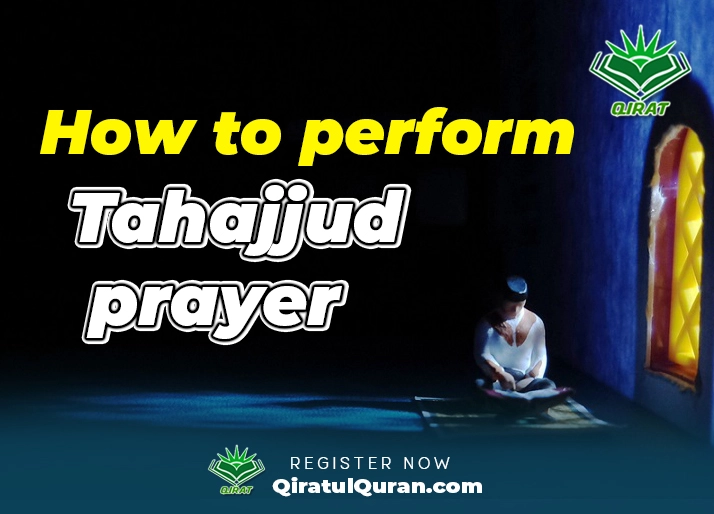The Tahajjud prayer, also known as Qiyam al-Layl, is a highly recommended voluntary prayer performed during the latter part of the night. It is a beloved act of worship to Allah (SWT) and was regularly practiced by the Prophet Muhammad (peace be upon him). In this article, Qiratul Quran will explore the various aspects of this remarkable prayer, including its significance, the method of performing it, and the numerous benefits it offers.

How many Rakats are in Tahajjud?
The minimum number of rakats (units) in the Tahajjud prayer is two, while the maximum is eight. It is recommended to perform an odd number of rakats, preferably three, five, seven, or nine. However, the most preferred number of rakats is eight, as it was the practice of the Prophet Muhammad (peace be upon him).
How do you perform the Tahajjud prayer?
To perform the Tahajjud prayer, follow these steps:
- Make Wudu (ablution): Perform a complete and valid wudu.
- Form the intention (Niyyat): Make the intention to perform the Tahajjud prayer, specifying the number of rakats you plan to pray.
- Recite the opening takbir (Allahu Akbar): Raise your hands to your ears and say “Allahu Akbar” to start the prayer.
- Recite the Istiftah: Recite the Istiftah, which includes Subhanaka, A’udhu billahi, and Bismillah.
- Recite Surah Al-Fatihah: Recite Surah Al-Fatihah, the opening chapter of the Quran.
- Recite a portion of the Quran: After Surah Al-Fatihah, recite any portion of the Quran that you know.
- Perform the ruku (bowing): Bow down and say “Subhana Rabbiyal Adheem” three times or more.
- Perform the sujood (prostration): Go into prostration and say “Subhana Rabbiyal A’la” three times or more. Then, raise your head and sit upright for a brief pause.
- Perform the second prostration: Prostrate again and repeat the same words as in the first prostration.
- Complete the first rakat: Stand up and recite Surah Al-Fatihah and a portion of the Quran again to complete the first rakat.
- Repeat for the desired number of rakats: Repeat the same process for the desired number of rakats, ending with the sitting position (qa’dah akhirah) for the final rakat.
- Perform the Tashahhud: In the final sitting position, recite the Tashahhud (testimony of faith).
- Recite the Salawat (sending blessings upon the Prophet): After the Tashahhud, recite the Salawat (sending blessings upon the Prophet Muhammad, peace be upon him).
- Perform the final Salam: Turn your face to the right and say “Assalamu alaikum wa rahmatullah,” then turn to the left and repeat the same words to complete the prayer.
What time is Tahajjud prayed at?
The ideal time to perform the Tahajjud prayer is in the last third of the night, after the Isha prayer and before the Fajr prayer. The Prophet Muhammad (peace be upon him) encouraged his followers to pray Tahajjud at this time, as it is a time of tranquility and closeness to Allah (SWT).
Is Tahajjud a sunnah or nafl?
Tahajjud is considered a highly emphasized and strongly recommended practice, known as a Sunnah Mu’akkadah (a confirmed Sunnah). It holds great significance and is mentioned numerous times in the Quran and the Sunnah. The (teachings of the Prophet Muhammad, peace be upon him).
What is the Niyyat for Tahajjud?
The intention (Niyyat) for performing the Tahajjud prayer should be to seek the pleasure of Allah (SWT) and to follow the Sunnah of the Prophet Muhammad (peace be upon him). The intention should be to pray the Tahajjud prayer and the number of rakats should be mentioned.
What is the benefit of Tahajjud rakat?
The benefits of performing the Tahajjud prayer are numerous and profound. Here are some of the most significant benefits:
- Forgiveness of sins: The Prophet Muhammad (peace be upon him) said, “Whoever prays during the night, his sins will be forgiven,” highlighting the immense forgiveness and mercy that can be attained through this prayer.
- Tranquility and peace of mind: Praying Tahajjud in the stillness of the night provides a sense of tranquility and inner peace. It is an opportunity to connect with Allah (SWT) in a serene environment, away from the distractions and worries of daily life.
- Spiritual nourishment: The Tahajjud prayer nourishes the soul and strengthens one’s relationship with Allah (SWT). It is a time for self-reflection, seeking guidance, and renewing one’s faith.
- Increase in blessings: The Prophet Muhammad (peace be upon him) said, “The best prayer after the obligatory prayers is the night prayer,” indicating the abundant blessings and rewards associated with this voluntary act of worship.
- Protection from harm: Performing the Tahajjud prayer can serve as a shield against harm and calamities, as mentioned in the Quran: “And in the hours before dawn, they would implore forgiveness” (Quran 51:18).
- Following in the footsteps of the Prophet: By praying Tahajjud, one is emulating the noble example of the Prophet Muhammad (peace be upon him), who would stand in voluntary prayer during the night, seeking the pleasure of Allah (SWT).
What is the dua after the Tahajjud prayer?
After completing the Tahajjud prayer, it is recommended to recite specific supplications (duas) to seek forgiveness, guidance, and blessings from Allah (SWT). Some of the most beloved and recommended duas to recite after Tahajjud include:
- Sayyidul Istighfar (The Chief Repentance): “Allahumma Anta Rabbee, Laa Ilaaha Illa Anta. Khalaqtanee Wa Ana ‘Abduka, Wa Ana ‘Alaa ‘Ahdika Wa Wa’dika Mastata’tu. A’oodhu Bika Min Sharri Maa Sana’tu. Aboo’u Laka Bi Ni’matika ‘Alayya, Wa Aboo’u Bizambee. Faghfirlee, Fa Innahu Laa Yaghfirudhunuba Illa Anta.”
- Dua for Protection: “Allahumma inni a’udhu bika min al-hammi wa’l-hazani, wa a’udhu bika min al-‘ajzi wa’l-kasali, wa a’udhu bika min al-jubni wa’l-bukhli, wa a’udhu bika min ghalabatid-daini wa qahrir-rijal.”
- Dua for Forgiveness: “Rabbighfir li ma qaddamtu wa ma akhkhartu wa ma asrartu wa ma a’lantu wa ma asraftu wa ma anta a’lamu bihi minni, antal muqaddimu wa antal mu’akhkhiru, la ilaha illa anta.”
- Dua for Guidance: “Allahumma inni as’aluka al-huda wa’l-taqwa wa’l-‘afafa wa’l-ghina.”
These are just a few examples, and many other beautiful duas can be recited after the Tahajjud prayer. It is recommended to consult reliable sources for more comprehensive guidance on the duas and supplications to be recited after this blessed prayer.
How do you calculate the third of the night?
Determining the night’s third is essential for performing the Tahajjud prayer at its ideal time. Here are some methods to calculate the third of the night:
- Subtract the Maghrib (sunset) time from the Fajr (dawn) time: The duration between Maghrib and Fajr represents the entire night. Divide this duration by three to find the approximate length of one-third of the night.
- Use online calculators or apps: Various online calculators and mobile applications are available that can accurately. Calculate the third of the night based on your location and the current date.
- Estimate based on local sunrise and sunset times: If you know the approximate time of sunrise and sunset in your area, you can estimate the third of the night by dividing the duration between sunset and sunrise into three equal parts.
It’s important to note that the calculation of the third of the night may vary depending on factors. Such as geographical location, seasons, and daylight hours. Therefore, it is advisable to consult local Islamic authorities or reliable sources for accurate timings specific to your area.
Conclusion
The Tahajjud prayer is a profound act of worship that holds immense spiritual significance in Islam. By performing this voluntary prayer during the last third of the night. The believers can seek forgiveness, guidance, and blessings from Allah (SWT). The specific method of performing the Tahajjud prayer, along with its numerous benefits. And make it a highly recommended practice in the life of a Muslim. By following the Sunnah of the Prophet Muhammad (peace be upon him) and praying Tahajjud with sincerity and devotion. That one can attain spiritual nourishment, tranquility, and a closer connection with the Almighty.





